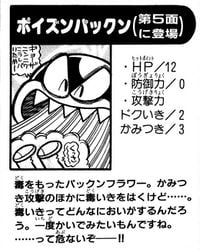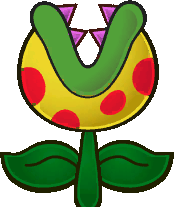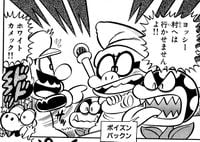Putrid Piranha: Difference between revisions
m (Robot: Removing template: BoxTop) |
(→Profiles and statistics: Added SPM bestiary infobox.) |
||
| Line 28: | Line 28: | ||
==Profiles and statistics== | ==Profiles and statistics== | ||
{{:Paper Mario bestiary|transcludesection=Putrid Piranha|align=horizontal}} | {{:Paper Mario bestiary|transcludesection=Putrid Piranha|align=horizontal}} | ||
{{ | {{:Super Paper Mario bestiary|transcludesection=Putrid Piranha|align=horizontal}} | ||
| | |||
}} | |||
==Names in other languages== | ==Names in other languages== | ||
Revision as of 17:28, May 19, 2017
| The Thousand-Year Door enemy | |||||||||||||||||||||||||||||
|---|---|---|---|---|---|---|---|---|---|---|---|---|---|---|---|---|---|---|---|---|---|---|---|---|---|---|---|---|---|
| Putrid Piranha | |||||||||||||||||||||||||||||
| File:Putrid Piranha.PNG | |||||||||||||||||||||||||||||
| Location(s) | Keelhaul Key | ||||||||||||||||||||||||||||
| Max HP | 8 | ||||||||||||||||||||||||||||
| Attack | 3 | ||||||||||||||||||||||||||||
| Defense | 0 | ||||||||||||||||||||||||||||
| Moves | Jaw Clamp (3), Poison Breath (2 to Mario and Partner, Poison, Piercing) | ||||||||||||||||||||||||||||
| Items | Super Shroom, Maple Syrup (drop only), FP Plus (drop only) | ||||||||||||||||||||||||||||
| Coins | 0 - 3 | ||||||||||||||||||||||||||||
| Log | A poisonous Piranha Plant. It'll poison your allies. Use your guard effectively to avoid poisoning. | ||||||||||||||||||||||||||||
| |||||||||||||||||||||||||||||
| |||||||||||||||||||||||||||||
| Tattle Log #: 57 | |||||||||||||||||||||||||||||
- “"IDENTIFIED AS...MARIO! ALERT! REPORT TO BOSS! ALERT! ALERT!"
”
- —Putrid Piranha, Paper Mario

There are two main species of Putrid Piranha in the Mario franchise. They are found in Paper Mario, Paper Mario: The Thousand-Year Door, and Super Paper Mario.
Just like the original Piranha Plant, the Paper Mario variety is red with white spots. They are located on Lavalava Island and in the depths of Mt. Lavalava. However, the Putrid Piranhas found in Paper Mario: The Thousand Year Door and Super Paper Mario are yellow with red spots. These can be found in either Keelhaul Key or The Land of the Cragnons. The Putrid Piranha is a little bigger than the average Piranha Plant and are best known for their nasty poison breath. Their first appearance was in Jade Jungle, in Paper Mario, when they attacked Baby Orange Yoshi.
History
Paper Mario series
Paper Mario
The Putrid Piranhas of Paper Mario are found on Lavalava Island. These Putrid Piranhas are red with white spots and have yellow-stained teeth. Putrid Piranhas are close relatives of the Piranha Plants. Unlike most other Piranha Plants, this Putrid Piranha can survive in the hot temperatures and conditions of Mt. Lavalava. Some of them also appear as mini-bosses in the Jade Jungle located on Lavalava Island. During battle Putrid Piranhas can use a poison breath attack. This attack poisons Mario while doing two points of damage.
Paper Mario: The Thousand-Year Door
Putrid Piranhas reappear in the sequel of Paper Mario as well and can be found on Keelhaul Key as uncommon enemies. Instead of being red with white spots, they are yellow with red spots. In addition, their teeth are purple. Like their Lavalava relatives, the Putrid Piranha has glands that turn their breath into a lethal poison. Unlike their Lavalava relatives, they do not droop and are not able to live in burning temperature. Unlike in the previous game, they cannot be jumped on in battle.
Super Paper Mario
These are the Putrid Piranhas that live in the Land of the Cragnons in Super Paper Mario. They look the same as the Putrid Piranhas from the previous game. This Putrid Piranha emerges from pipes and will only use its poisonous breath instead of the chomp. These Putrid Piranhas have a high chance of dropping items, especially Horsetails due to the poison status being very deadly if the player has no items. It is possible to stomp it when it is exhaling the poisonous gas by jumping on its exposed head.
Super Mario-Kun
Putrid Piranhas appear in volume 26 of Super Mario-Kun. When a White Magikoopa ambushes Mario and his partners in Lavalava Island, he uses Putrid Piranha plants. They bite Mario's head and let out a bad breath, poisoning Mario and Goombario. The Fearsome 5, however, comes to the rescue and attack the White Magikoopa while sealing the Putrid Piranhas' mouth with tape. One of the Yoshis then defeats the White Magikoopa by using a Thunder Rage on him.
Profiles and statistics
| Paper Mario enemy | |||||||||
|---|---|---|---|---|---|---|---|---|---|
| Putrid Piranha | |||||||||

|
Max HP | 12 | Attack | 3 | Defense | 0 | |||
| Role | Common, boss | Type | Ground | Level | 17 | ||||
| Strong | None | Weak | None | Moves | Bite (3), Poison Breath (2, Poison - Good, 3) | ||||
| Sleep? | 95%, 1 | Dizzy? | 50%, 0 | Shock? | 90%, 0 | ||||
| Shrink? | 75%, 0 | Stop? | 85%, 0 | Fright? | 30% | ||||
| Air Lift? | 20% | Hurricane? | 20% | Coins | 1 + 1-3 | ||||
| Items | Fire Flower, Super Shroom | Run | 24 | Location(s) | Jade Jungle, Mt. Lavalava | ||||
| Tattle | This is a Putrid Piranha. Max HP: 12, Attack Power: 3, Defense Power: 0 Putrid Piranhas sometimes bite, but the truly scary thing is their nasty, poisonous breath. The power of their bad breath is 2, but your HP will begin to fall if you get poisoned. You should try to recover as quickly as possible if you get poisoned. | ||||||||
| Super Paper Mario enemy | |||||||||
|---|---|---|---|---|---|---|---|---|---|
| Putrid Piranha | |||||||||

|
Max HP | 5 | Role | Common | Location(s) | Downtown of Crag (5-1), Gap of Crag (5-2), Floro Caverns (5-3 and 5-4) | |||
| Attack | 2 | Card type | Common | ||||||
| Defense | 0 | Items | Horsetail, Keel Mango, Fresh Veggie, Peachy Peach | Card location(s) | Card Shop; Catch Card/SP | ||||
| Score | 500 | ||||||||
| Card description | It's a poisonous Piranha Plant. As they say, every rose has its venomous bite. | ||||||||
| List of Catch Cards 57 58 59 |
Tattle | This disgusting weed is a Putrid Piranha. It will spew poisonous sludge at you... Max HP is 5 and Attack is 2. if you are poisoned, you will lose HP quickly... Thankfully, most items that restore HP also cure poison. Some say that pollution turned them into poisonous weeds... | |||||||
